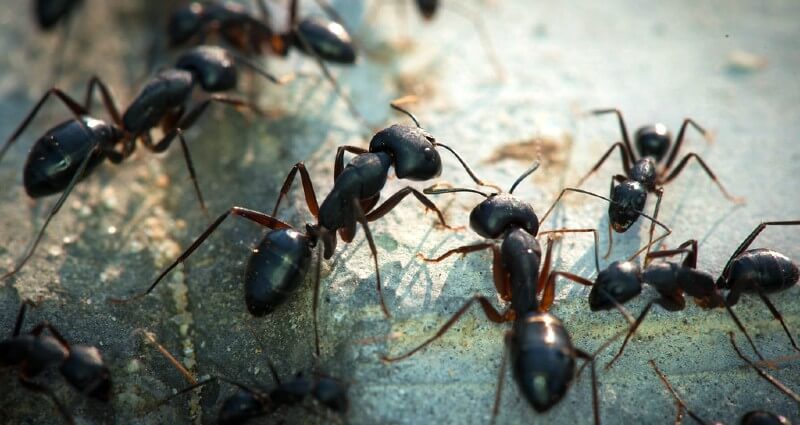Environmental Effect of Insect Control: Balancing Performance With Sustainability
The environmental impact of bug control is a vital concern that requires a fragile balance between attaining effectiveness in managing pests and ensuring sustainability of our ecosystems. From the use of unsafe chemicals that seep into our soil and water to the unplanned repercussions on non-target types, the repercussions of conventional parasite control techniques are far-ranging.
Hazardous Chemicals in Insect Control
The use of damaging chemicals in parasite control postures substantial ecological and health and wellness threats that require cautious consideration and mitigation techniques. Insecticides, pesticides, and herbicides are generally utilized to remove pests, but their widespread application can bring about unplanned effects. These chemicals can pollute dirt, water resources, and the air, impacting not only the targeted insects but additionally beneficial insects, wild animals, and people.

To resolve these dangers, integrated bug administration (IPM) methods are being promoted as a more sustainable option. IPM includes a combination of methods such as organic control, environment control, and the targeted usage of chemicals as a last resource (ant control indian trail nc). By taking on an all natural strategy to pest control, we can decrease the environmental and health influences related to dangerous chemicals while efficiently handling pest populaces
Effect On Non-Target Types
Considering the unplanned repercussions of insect control methods, the effect on non-target types is a vital aspect that needs detailed examination. While bug control measures intend to target particular pests, various other organisms in the ecological community may be accidentally affected. Non-target varieties, including useful insects, birds, animals, and also plants, can suffer straight or indirect damage from pesticide applications or organic control approaches.
Pesticides can have sub-lethal or deadly effects on non-target varieties. For instance, insecticides made to fight a specific insect parasite may hurt pollinators like or all-natural killers such as ladybugs. In addition, chemical residues can build up in the setting, affecting non-target microorganisms over time. Biological control agents, if not species-specific, can present threats to unintended targets, interrupting the ecological equilibrium.
To reduce the effect on non-target types, incorporated bug management (IPM) techniques that highlight an alternative method to pest control are suggested. These techniques focus on making use of environmentally friendly practices, minimizing injury to useful organisms while efficiently taking care of pest populations. Conducting comprehensive risk analyses and monitoring the end results of bug control efforts are important action in guarding non-target species and advertising general community health.
Dirt and Water Contamination
Unexpected ecological consequences of bug control methods expand beyond affecting non-target varieties, with significant ramifications for dirt and water contamination - termite control services. Pesticides, herbicides, and chemical fertilizers made use of in pest control can leach into the dirt and contaminate groundwater, presenting a hazard to both terrestrial and aquatic ecological communities.
Water contamination is one more crucial problem linked with pest control practices. Runoff from farming areas treated with chemicals can lug these chemicals right into neighboring water bodies, affecting aquatic organisms and water high quality. Impurities in water resources can have far-ranging effects, impacting not only aquatic life however likewise human health and wellness via the intake of infected water or water microorganisms. To mitigate soil and water contamination from pest control tasks, incorporated parasite administration techniques that prioritize sustainability and minimize chemical inputs are essential.
Air Pollution From Pesticide Usage
Direct exposure to airborne pesticides throughout farming applications positions a considerable issue for air pollution control actions. They can volatilize right into the air and kind volatile natural compounds (VOCs) and other air-borne pollutants when pesticides are splashed onto crops - ant control services. These chemicals can contribute to the development of ground-level ozone, a major component of smoke that can have damaging effects on human wellness, crop performance, and overall air quality. In addition, pesticide drift, where chemicals are carried by the wind to unplanned areas, can bring about the contamination of nearby ecological communities and water bodies.

Techniques for Sustainable Bug Control
In the world of farming methods, applying sustainable pest control techniques is vital for keeping ecological balance and securing plant returns. Lasting parasite control stresses using environmentally friendly methods to handle bug populaces properly while minimizing harm to non-target organisms and environments. Integrated Pest Management (IPM) is a widely adopted method that combines biological, cultural, physical, and chemical control approaches to achieve long-lasting parasite monitoring remedies.
Plant turning and diversification are additionally efficient techniques to interrupt pest life cycles and create much less beneficial conditions for parasites to flourish. Inevitably, by integrating these lasting insect control approaches, farmers can achieve an equilibrium between pest monitoring effectiveness and ecological stewardship.
Verdict
In verdict, the environmental effect of parasite control techniques have to be very carefully considered to ant control cherryville nc balance performance with sustainability. Dangerous chemicals used in insect control can bring about soil and water contamination, air pollution, and injury non-target species - termite control. It is important to apply sustainable insect control methods to decrease these negative effects on the environment and advertise a much healthier ecosystem for future generations
By adopting an alternative technique to pest control, we can decrease the ecological and health effects linked with harmful chemicals while efficiently handling pest populations.

To reduce the air contamination caused by chemical usage, it is vital to take on integrated parasite management methods that prioritize the use of non-chemical parasite control methods, such as plant rotation, all-natural killers, and resistant crop selections. Sustainable insect control stresses the use of eco pleasant approaches to manage insect populations properly while reducing damage to non-target organisms and environments. Integrated Parasite Management (IPM) is a commonly taken on approach that integrates organic, social, physical, and chemical control methods to accomplish lasting pest management options.
Comments on “Why Pick Our Termite Control Services: Expert Solutions for Effective Defense”